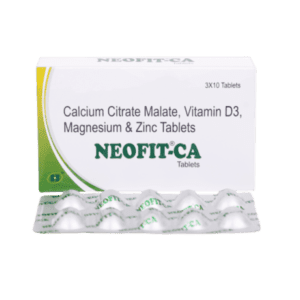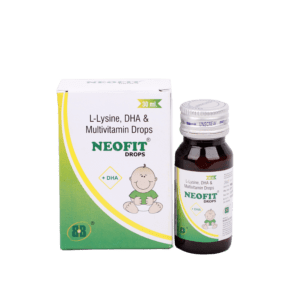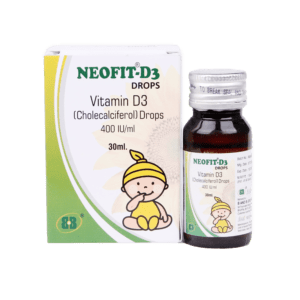NEOFIT- SURE TAB.
(Ubidecarenone, L-Carnitine, L-Arginine, Piperine, DHA, EPA, Natural Mixed Carotenoids, Lycopene, Selenium, Zinc Sulphate & Vitamin B12)
Pretreatment with coenzyme Q10(NEOFIT-SURE TAB.) improves ovarian response and embryo quality in low-prognosis young women with decreased ovarian reserve.
Background:-
Oxidative stress and mitochondrial dysfunction are among the most investigated possible mechanisms [11]. Mitochondria are the most abundant organelles in oocytes and early embryos that generate approximately 90% of reactive oxygen species (ROS), the end products of oxygen metabolism, and convert ROS into an inactive state via antioxidant defense mechanisms [12]. Higher levels of ROS accumulating in mitochondria during multiple physiological conditions contribute to mitochondrial dysfunction and increase in oxidative stress. This, in turn, leads to oxidative damage to DNA and other intra-cellular aberrations, which are similar to the age-related changes [12, 13]. Thus, improving mitochondrial function by supplementing antioxidants has been proposed as one of the important strategies to enhance reproductive performance [11, 14].
Abstract Background: -Management of women with reduced ovarian reserve or poor ovarian response (POR) to stimulation is one of the major challenges in reproductive medicine. The primary causes of POR remain elusive and oxidative stress was proposed as one of the important contributors. It has been suggested that focus on the specific subpopulations within heterogeneous group of poor responders could assist in evaluating optimal management strategies for these patients. This study investigated the effect of anti-oxidant treatment with coenzyme Q10 (CoQ10) (NEOFIT-SURE TAB) on ovarian response and embryo quality in young low-prognosis patients with POR.
Methods:-
This prospective, randomized controlled study included 186 consecutive patients with POR stratified according to the POSEIDON classification group 3 (age < 35, poor ovarian reserve parameters). The participants were randomized to the CoQ10 (NEOFIT-SURE TAB.) pre-treatment for 60 days preceding IVF-ICSI cycle or no pre-treatment. The number of high quality embryos was a primary outcome measure.
Discussion:- In this study we demonstrated potential benefit of CoQ10 (NEOFIT-SURE TAB.) treatment in improving ovarian response to gonadotrophin stimulation in young women with low ovarian reserve. To the best of our knowledge, this is the first study that evaluated an effect of anti-oxidant treatment in specific phenotypic subgroup of women with POR.
Our results demonstrate that pre-treatment with CoQ10 (NEOFIT-SURE TAB.) resulted in significant decrease in the total amount of gonadotrophin needed to achieve ovarian response, shorter duration of stimulation, higher peak E2 levels and the number of oocytes retrieved. CoQ10 treatment led to significant increase in fertilization rate and in the number of high quality embryos. There was significantly lower rate of cancelled cycles because of no response to stimulation, less cancelled embryo transfers because of failed embryo development and larger number of cycles with cryopreserved embryos in the CoQ10 treated group than in controls. The clinical pregnancy and live birth rates were higher after CoQ10 treatment then in controls, our data suggest that CoQ10 administration enhances ovarian response to stimulation and improves oocyte and embryo quality.with improved reproductive outcomes. Small randomized placebo-controlled study. The findings of this study are approximately in line with previous reports that linked CoQ10 (10 women in CoQ10 and 14 in placebo group) have demonstrated higher peak concentration of E2, increased number of high quality cleavage embryos, and a trend towards decreased aneuploidy and higher clinical pregnancy rate after 60 days treatment with coQ10. 101 young women with PCOS demonstrated that addition of CoQ10 in a dose of 180 mg during ovulation induction with clomiphene citrate improved ovarian response in clomiphene-resistant women and resulted in higher clinical pregnancy rate [24]. Retrospective analysis in 797 IUI and 253 IVF cycles in women older than 36–37 years revealed that addition of 600 mg CoQ10 to dehydroepiandrosterone (DHEA) over the period.
The plausible effect of CoQ10 on reproductive function is attributed to its effect on the antioxidative capacity and energy production in the oocyte [10, 28, 29]. CoQ10, the only synthesized lipid soluble antioxidant in humans, is an essential component of the mitochondrial respiratory chain, serving an important antioxidant function both in mitochondria and in lipid membranes [15]. ROS-induced DNA damage in ovary leads to genomic instability, mutations and apoptosis of oocytes, and is thought to be ameliorated by an antioxidant activity of CoQ10 [22]. CoQ10 has been also shown to improve
mitochondrial function and restore energy production by mitochondria [23]. Mitochondrial dysfunction in oocytes results in decreased oxidative phosphorylation and suboptimal levels of mitochondria-generated ATP, which has been strongly associated with poor reproductive performance, including diminished ovarian reserve, poor oocyte quality, abnormal fertilization and deranged preimplantation embryo development [29, 30]. Energy production by mitochondria is important for steroid hormone biosynthesis, oocyte maturation, fertilization, and early embryonic development [31, 32]. It has been demonstrated that CoQ10 supplemented in aged animal model has improved mitochondrial membrane potential, mitochondrial ATP production and mitotic spindle orientation [21]. Treatment with CoQ10 increased the number of ovulated oocytes and reduced ROS in oocytes to the levels observed in young animals, indicating this is an effective strategy to reverse the effect of reproductive ageing [33]. In humans, levels of CoQ10 in the follicular fluid positively correlated with oocyte maturation, embryo grade and pregnancy rate in women undergoing ART [34, 35]. While oocyte appears to be the main target of CoQ10.
Conclusion:- Pretreatment with CoQ10 (NEOFIT-SURE TAB.)improves ovarian response to stimulation and embryological parameters in young women with poor ovarian reserve in IVF-ICSI cycles. Further work is required to determine whether there is an effect on clinical treatment endpoints.
Keywords: Poor ovarian response, POSEIDON stratification, Oxidative stress, Coenzyme Q10 (NEOFIT-SURE TAB.) In vitro fertilization, High-quality embryos, Clinical outcomes.
Coenzyme Q10and L-carnitine in NEOFIT-SURE TAB. To deliver fuel and facilitate the production of a high-energy compound called adenosine triphosphate, coenzyme is an essential component of the inner mitochondrial membrane. CoQ10 is primarily involved in electron transport in the mitochondrial respiratory chain and oxidative phosphorylation to produce adenosine triphosphate (ATP). CoQ10 acts as an antioxidant by inhibiting lipid peroxidation and DNA oxidation, thus is capable of strengthening endogenous antioxidant system within a cell [15]. CoQ10 supplementation has been shown to improve cardiovascular function and male fertility [16–18]. Reduced concentrations of CoQ10 in plasma have been associated with hypogonadism and altered levels of other steroid hormones [19]. Decrease in CoQ10 level is commonly observed in individuals in late 30th and appears to co-occur with the age-related decline in fertility and increased rate of embryo aneuploidy, suggesting a contribution of the reduced expression of CoQ10 to ovarian ageing [20]. Several animal studies have demonstrated that CoQ10 protects ovarian reserve, counteracts
physiological ovarian ageing by restoring mitochondrial function and increases the rate of embryo cleavage and blastocyst formation [21–23]. In the clinical setting, CoQ10 supplementation led to better response to ovulation induction and decreased odds of fetal aneuploidy in 35–43-year-old women [24, 25].
On the above evidence, this study focused on investigating the effect of CoQ10 supplementation on response to ovarian stimulation in the group of young women with diminished ovarian reserve, corresponding to the Poseidon’s stratification group 3 [9]. We hypothesized that increased oxidative stress has a prominent effect on premature decline of ovarian function in these women, which could be amenable to anti-oxidant therapy.
This was a prospective randomized controlled study, conducted at the Reproductive Medical Center of the Peking University Third Hospital, a tertiary university hospital and a center of excellence in Reproductive Medicine in China.
Miscarriage rate was 8.67% in women from the CoQ10 group and 12.5% in controls. Although women from the CoQ10 group had higher clinical pregnancy and live birth rates with lower occurrence of pregnancy loss, the difference between the treatment and control groups failed to achieve statistical significance for each of these outcomes.
In summary, pretreatment with CoQ10(NEOFIT-SURE TAB.) increases ovarian response to stimulation and improves oocyte and embryo quality in young low prognosis patients with diminished ovarian reserve. There is a possible beneficial effect on clinical pregnancy and live birth rates.
This study was supported by National key research and development project (2016YFC1000302) and the scientific research foundation for the returned overseas Ministry of Education (A70538–





Reviews
There are no reviews yet.